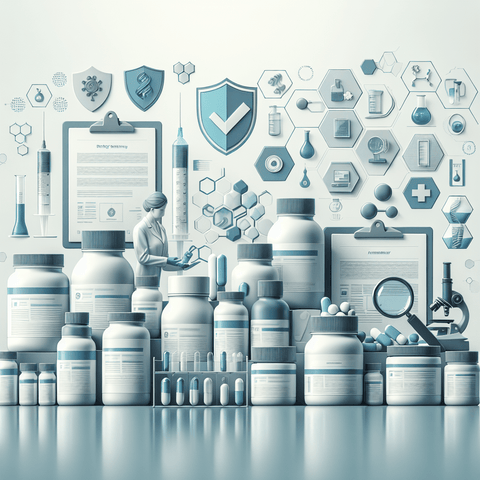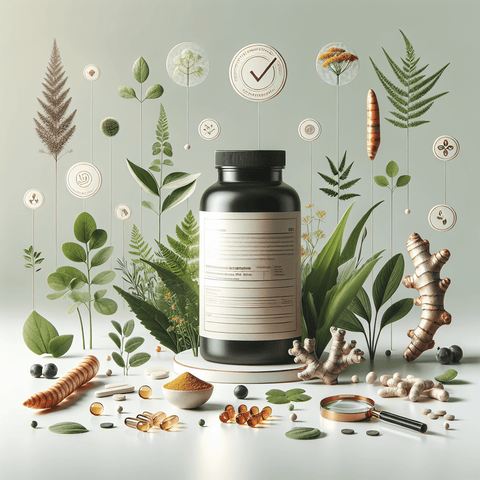Introducción
La industria de los suplementos ha experimentado un crecimiento tremendo en los últimos años, con más consumidores recurriendo a vitaminas, minerales y extractos herbales para apoyar sus objetivos de salud y bienestar. Sin embargo, este mercado en expansión viene con un desafío significativo: asegurar la seguridad, calidad y autenticidad de los productos disponibles. Con miles de opciones en el mercado, seleccionar un suplemento que no solo sea efectivo sino también libre de contaminantes requiere más que simplemente leer la etiqueta—demanda una comprensión de las pruebas de terceros.
Los suplementos probados por terceros se destacan como un faro de confiabilidad en un mar de productos dietéticos. A diferencia de las pruebas internas, las pruebas de terceros son realizadas por laboratorios independientes que verifican los ingredientes, potencia y pureza del suplemento. Esta verificación añade una capa esencial de responsabilidad y transparencia, protegiendo a los consumidores de afirmaciones engañosas y asegurando que lo que está escrito en la etiqueta coincida con lo que hay dentro del frasco.
En esta guía completa, profundizaremos en cómo elegir suplementos probados por terceros en los que realmente puedes confiar. Exploraremos qué implica la prueba de terceros, destacaremos algunas de las entidades certificadoras más reputadas y explicaremos cómo entender los resultados de laboratorio como los Certificados de Análisis (COAs). Además, compartiremos consejos prácticos sobre cómo identificar marcas de suplementos certificadas, detectar fabricantes de alta calidad e interpretar plataformas de revisión independientes.
Para aquellos que buscan mejorar su salud a través de suplementos dietéticos—desde potenciar la inmunidad con vitamina C hasta apoyar la salud ósea con vitamina K—saber qué productos están probados por terceros puede marcar toda la diferencia. Este post te empoderará con el conocimiento que necesitas para comprar con confianza y elevar tu camino hacia el bienestar de manera inteligente.
Comprendiendo los Suplementos Probados por Terceros para el Bienestar Nutricional
La prueba de terceros se refiere a la evaluación de un producto por una organización independiente que no tiene interés financiero en el fabricante, proveedor o producto en sí. Estos laboratorios independientes evalúan suplementos dietéticos basados en varias métricas de calidad, incluida la pureza, potencia, identidad y la presencia de contaminantes dañinos. El objetivo es proporcionar a los consumidores datos imparciales sobre lo que realmente hay dentro del contenedor del suplemento.
La necesidad de pruebas de terceros surge de las inconsistencias en la industria de los suplementos. Debido a regulaciones limitadas, las empresas de suplementos no siempre están legalmente obligadas a verificar las afirmaciones de la etiqueta mediante pruebas externas. Esta brecha puede llevar a discrepancias significativas entre lo prometido y lo entregado. Por ejemplo, productos como los omega-3 o los polvos de proteína a veces se encuentran que contienen significativamente menos ingrediente activo del anunciado, o peor aún, están contaminados con metales pesados o microbios. Estos tipos de problemas son más que simples errores de etiquetado; representan riesgos reales para la salud humana.
Varias organizaciones renombradas realizan pruebas de terceros para suplementos dietéticos:
- USP (United States Pharmacopeia): Conocida por sus estándares rigurosos, USP prueba la precisión de los ingredientes, biodisponibilidad y posibles contaminantes.
- NSF International: Esta organización evalúa productos para la exactitud de la etiqueta y la ausencia de niveles dañinos de contaminantes. Son particularmente conocidos por certificar suplementos deportivos.
- ConsumerLab: Ofrece resultados de pruebas y calificaciones de calidad para una amplia gama de suplementos. Operan independientemente y se centran en la educación del consumidor.
- Informed-Choice e Informed-Sport: Programas enfocados en asegurar que los suplementos deportivos no contengan sustancias prohibidas.
Tipos comunes de suplementos que particularmente necesitan verificación de terceros incluyen:
- Aceite de pescado y Omega-3: Estos son propensos a la oxidación y pueden contener contaminantes como mercurio o PCBs. Busca certificaciones de pureza y frescura. Puedes ver opciones de alta calidad de omega-3 aquí.
- Vitamina D: Los estudios han revelado inconsistencias en el contenido de Vitamina D. Las pruebas de laboratorio independientes verifican tanto la potencia como la pureza. Explora opciones verificadas por terceros aquí.
- Polvos de Proteína: Algunos productos tienen dosis insuficientes o contienen azúcares ocultos y contaminantes como arsénico y plomo.
En última instancia, las pruebas de terceros fomentan una mayor responsabilidad en la industria de los suplementos. Al elegir productos verificados, proteges tu inversión y tu salud, minimizando el riesgo de contaminación o subdosis mientras maximizas la posibilidad de que el suplemento entregue el beneficio previsto.
Enfoque en Marcas de Suplementos Certificadas: Qué Buscar
No todas las marcas de suplementos son iguales. Las marcas de suplementos certificadas son aquellas que han sometido voluntariamente sus productos a auditorías, evaluaciones y procedimientos de prueba externos para obtener sellos y símbolos de calidad específicos. Para el consumidor consciente de la salud, estas certificaciones actúan como un atajo para la confianza y la transparencia.
Aquí están algunas de las certificaciones más importantes que debes buscar al elegir suplementos:
- Marca Verificada USP: Indica que el suplemento contiene los ingredientes listados en la etiqueta, en la potencia y cantidades declaradas, y no contiene niveles dañinos de contaminantes.
- Certificado NSF para Deporte: Asegura que un suplemento está libre de sustancias prohibidas por las principales organizaciones deportivas. Especialmente importante para atletas competitivos.
- Certificado GMP (Buenas Prácticas de Fabricación): Verifica que el producto ha sido fabricado en una instalación que cumple con estándares internacionales de limpieza, trazabilidad y documentación.
- Proyecto No GMO Verificado: Indica que el producto no contiene organismos genéticamente modificados, verificado mediante procesos rigurosos.
- Certificación Orgánica (por ejemplo, USDA Organic): Garantiza que los ingredientes se producen sin fertilizantes sintéticos, pesticidas u organismos genéticamente modificados.
Las certificaciones hacen más que decorar una etiqueta; mejoran la confianza del consumidor y comunican el compromiso de la marca con la calidad. De hecho, los fabricantes que llevan estas certificaciones suelen ser más transparentes sobre sus procesos de aprovisionamiento, producción y pruebas.
Algunas marcas bien conocidas por su compromiso con las pruebas de terceros y la transparencia incluyen:
- Thorne Research
- Pure Encapsulations
- Nordic Naturals (particularmente para omega-3)
- Garden of Life (muchos productos certificados orgánicos y no GMO)
Al comprar en plataformas como Topvitamine, busca estas certificaciones tanto en la descripción del producto como en las etiquetas para asegurarte de que estás comprando de una marca de suplementos certificada. Por ejemplo, si estás buscando suplementos de magnesio de alta calidad, verifica los sellos de verificación en la página del producto antes de comprar.
Verificación de la Calidad de los Suplementos: La Clave para un Uso Seguro y Efectivo
Cuando hablamos de verificación de la calidad de los suplementos, nos referimos a un proceso científico mediante el cual se prueba un suplemento para asegurar que cumple con criterios establecidos de seguridad, identidad, fuerza y pureza. Piensa en ello como un punto de control de calidad que cada suplemento debería pasar antes de llegar a tu estantería—desafortunadamente, no todos lo hacen.
Diferentes tipos de pruebas de laboratorio se utilizan en la verificación de calidad:
- Pruebas de Potencia: Miden si el suplemento contiene la cantidad correcta de cada ingrediente, tal como se lista en la etiqueta.
- Pruebas de Pureza: Identifican la presencia de sustancias no deseadas como metales pesados, pesticidas o contaminación microbiana.
- Pruebas de Identidad: Confirman que los ingredientes listados en la etiqueta están realmente presentes en el producto.
- Pruebas de Disolución/Desintegración: Verifican cómo y si la píldora se disuelve en el tracto digestivo para una absorción adecuada.
Un punto de distinción importante radica en si estas pruebas se realizan internamente o a través de laboratorios externos de terceros. Si bien las empresas reputadas pueden mantener protocolos de prueba internos de alta calidad, el potencial conflicto de intereses significa que las pruebas de terceros siguen siendo el estándar de oro. Los laboratorios externos ofrecen verificación imparcial que reduce la posibilidad de afirmaciones engañosas o un control de calidad deficiente que se filtre.
La verificación se vuelve especialmente importante para nutrientes que pueden ser dañinos a altas dosis. Por ejemplo:
- Hierro: Una sobredosis de hierro puede resultar en malestar gastrointestinal o incluso toxicidad, especialmente en niños.
- Vitamina A: En dosis excesivas, puede ser teratogénica o causar daño hepático.
Para los consumidores, la transparencia en la verificación de calidad generalmente se puede determinar solicitando o viendo el Certificado de Análisis (COA) del producto, que describe los resultados de todas las pruebas de laboratorio. Las empresas reputadas hacen que este documento esté fácilmente disponible ya sea en sus sitios web o bajo solicitud.
Al elegir productos que pasan por una verificación de calidad integral, aseguras no solo la eficacia del suplemento, sino también tu propia seguridad. Esta diligencia construye la integridad de tu rutina de suplementos con el tiempo, lo cual es fundamental para lograr resultados genuinos de bienestar.
Empresas de Suplementos Confiables: Cómo Detectar Fabricantes Reputados
Con miles de proveedores de suplementos compitiendo por la atención del consumidor, es esencial identificar empresas de suplementos confiables que adhieran a prácticas éticas y prioricen la integridad del producto. Una buena reputación en la industria de los suplementos se gana—no se reclama—y conocer los signos de un fabricante reputado puede ayudarte a evitar fraudes y productos ineficaces o peligrosos.
Aquí tienes señales de advertencia a tener en cuenta al evaluar una empresa de suplementos:
- Afirmaciones de Marketing Irrealistas: Cualquier afirmación que sugiera que un suplemento puede "curar" una enfermedad u ofrezca resultados inmediatos y milagrosos debe generar sospechas. Tales declaraciones probablemente violan regulaciones.
- Falta de Transparencia: Las empresas reputadas publicitan los orígenes de aprovisionamiento, ubicaciones de fabricación y proporcionan acceso a COAs.
- Falta de Información de Contacto: Una empresa legítima debe ofrecer vías de servicio al cliente, incluyendo números de teléfono, correos electrónicos de soporte o direcciones físicas.
Los fabricantes confiables a menudo tienen los siguientes atributos:
- Aprovisionamiento de Alta Calidad: Divulgan el origen geográfico y la sostenibilidad de sus ingredientes crudos.
- Fabricación Cumpliendo GMP: Las instalaciones operan bajo pautas que previenen la contaminación y aseguran consistencia.
- Procedimientos de Pruebas de Terceros: Estas compañías destacan sus contratos con laboratorios independientes y a menudo publican los resultados de las pruebas en línea.
Empresas bien conocidas que a menudo aparecen en Topvitamine incluyen fabricantes como Thorne, NOW Foods y Pure Encapsulations, todas las cuales son elogiadas por mantener la integridad científica, usar ingredientes de grado farmacéutico y priorizar protocolos de prueba integral.
En última instancia, al seleccionar un producto—ya sea un suplemento de vitamina K o una cápsula de magnesio de alta resistencia—comprar de fabricantes reputados significa que es significativamente menos probable que consumas productos de baja calidad o peligrosos.
Pruebas Independientes de Suplementos: Por Qué la Objetividad Importa
Las pruebas independientes de suplementos juegan un papel crucial al proporcionar información objetiva y confiable a los consumidores. El distintivo de una suplementación confiable es la capacidad de eliminar el sesgo del proceso de evaluación, donde entran los laboratorios independientes de terceros. Estos laboratorios son libres de influencia por parte de los fabricantes y proporcionan una evaluación imparcial de la calidad del producto.
La diferencia entre las pruebas internas y las pruebas independientes de suplementos radica en la responsabilidad. Los laboratorios internos tienen un conflicto de intereses inherente; su lealtad suele estar con la empresa matriz, no con el consumidor. Los laboratorios independientes, por otro lado, no tienen participación en el éxito financiero de la empresa, lo que les permite ofrecer resultados de pruebas basados en evidencia sin filtrar.
Plataformas de revisión independientes, como:
- ConsumerLab: Ofrece revisiones basadas en suscripción y comparaciones de laboratorio de suplementos nutricionales en varias categorías.
- Labdoor: Compra productos de manera independiente de los vendedores y los prueba para metales pesados, integridad de ingredientes activos y más.
Estas plataformas publican frecuentemente clasificaciones de productos y ofrecen a los consumidores resúmenes fáciles de entender sobre calidad, valor y precisión de etiquetas.
La razón por la que la objetividad importa no es solo ética—es biológica. Consumir un suplemento con contaminantes desconocidos (por ejemplo, plomo, arsénico, pesticidas) o ingredientes incorrectamente listados puede afectar adversamente al cuerpo, especialmente si se usa a largo plazo. Por ejemplo, la mala etiquetación en suplementos de omega-3 no solo arriesga la exposición a grasas inestables sino que también reduce la eficacia en el apoyo al bienestar cardiovascular.
En última instancia, las pruebas independientes actúan como un mecanismo de salvaguardia en un mercado en gran parte poco regulado, permitiendo a los consumidores verificar antes de confiar. Ya sea que estés comprando un básico como la vitamina D o explorando nuevas líneas herbales, consultar recursos independientes puede ofrecer otra capa de confianza en tus elecciones.
Pureza Verificada de Suplementos: Asegurando Productos Limpios y Libres de Contaminantes
La pureza verificada de los suplementos es una piedra angular de la seguridad y eficacia de los mismos. Las pruebas de pureza aseguran que un suplemento esté libre de contaminantes dañinos como metales pesados (por ejemplo, plomo, mercurio, cadmio), pesticidas, organismos microbianos y solventes residuales—todos los cuales podrían causar efectos adversos para la salud, especialmente cuando se consumen regularmente o por grupos vulnerables como niños, mujeres embarazadas y atletas.
Ciertos suplementos son más propensos a la contaminación y, por lo tanto, se benefician significativamente de las pruebas de pureza verificada:
- Suplementos Herbales: Estos pueden contener residuos de pesticidas o contaminación microbiana dependiendo del origen y manejo.
- Suplementos de Aceite de Pescado: Las opciones de alta calidad, como las encontradas aquí, son filtradas para eliminar mercurio, PCBs y dioxinas.
- Polvos de Proteína y Mezclas de Verdes: Riesgo de contaminación por metales pesados como plomo o arsénico.
El Certificado de Análisis (COA) es tu mejor aliado al verificar la pureza. Este documento incluye resultados detallados de las pruebas de laboratorio y generalmente confirma: - La identidad de los ingredientes - Niveles de potencia - La ausencia (o presencia) de metales pesados, bacterias o moho
Entender cómo leer un COA es vital. Los puntos clave incluyen números de lote, metodología de prueba, información del laboratorio y marcadores de aprobación/fallo. La mayoría de las empresas éticas te permitirán acceder a este documento antes de realizar una compra.
La pureza no es solo un bono; es un componente fundamental de la calidad del suplemento. Mientras que la eficacia trata de si un producto funciona, la pureza aborda la seguridad—un factor no negociable cuando se trata de rutinas de bienestar a largo plazo o recomendar suplementos a amigos o familiares.
Conclusión y Consejos Accionables
Elegir suplementos probados por terceros no es solo algo "bueno de tener"—es una parte esencial de cualquier estrategia de bienestar responsable. Desde verificar la autenticidad de los ingredientes hasta asegurar que el producto esté libre de contaminantes, las pruebas de terceros te brindan tranquilidad en una industria altamente saturada y a menudo opaca.
Aquí tienes una lista rápida para guiar tu selección de suplementos:
- Busca logotipos de certificación de terceros como USP, NSF o Informed-Choice
- Verifica la disponibilidad de un COA para cualquier suplemento que estés considerando
- Evita marcas con aprovisionamiento poco claro, afirmaciones no verificables o falta de transparencia
- Usa recursos objetivos como ConsumerLab o Labdoor para validar las afirmaciones de los suplementos
- Compra en plataformas reputadas como Topvitamine.com que seleccionan su oferta de productos
Consulta siempre con un profesional de la salud antes de comenzar cualquier nuevo régimen de suplementos, especialmente si estás embarazada, amamantando o manejando una condición de salud crónica.
Para una selección cuidadosamente curada de suplementos de alta calidad probados por terceros, incluidos vitamina C, vitamina D y omega-3, visita nuestra extensa colección en Topvitamine.com.
Sección de Preguntas y Respuestas
P: ¿Por qué es importante la prueba de terceros para los suplementos?
R: La prueba de terceros asegura que un suplemento contenga lo que dice en la etiqueta y esté libre de contaminantes. Construye la confianza del consumidor y minimiza los riesgos para la salud.
P: ¿Cuáles son algunas organizaciones certificadoras de terceros confiables?
R: USP, NSF, ConsumerLab e Informed-Choice son algunas de las certificadoras de terceros más reputadas en la industria de los suplementos.
P: ¿Cómo puedo saber si un suplemento ha sido probado por terceros?
R: Busca logotipos de certificación en la etiqueta, solicita o accede al COA y consulta sitios de pruebas independientes como Labdoor o ConsumerLab.
P: ¿Puedo confiar únicamente en las etiquetas al elegir un suplemento?
R: No. Las etiquetas pueden ser engañosas. Siempre busca verificación de terceros o compra de minoristas confiables que realicen cribados de calidad.
P: ¿Todos los suplementos en topvitamine.com están probados por terceros?
R: Topvitamine se enfoca en ofrecer productos de alta calidad y verificados. Se anima a los clientes a revisar las certificaciones específicas de los productos y los COA donde estén disponibles.
Palabras Clave Importantes
- suplementos probados por terceros
- marcas de suplementos certificadas
- verificación de la calidad de los suplementos
- empresas de suplementos confiables
- pruebas independientes de suplementos
- pureza verificada de suplementos
- certificado de análisis (COA)
- seguridad de suplementos nutricionales
- certificaciones de suplementos
- suplementos libres de contaminantes



